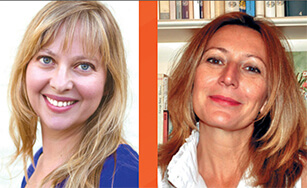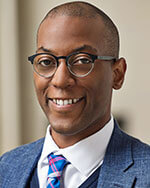Above: Detail from Golan Moskowitz. A Jewish History of Drag?, 2025.

Laura Limonic & Federica Schoeman
The Summer 2025 “Rainbow Issue” of AJS Perspectives has been curated by guest editor Bryan K. Roby, associate professor of Jewish and Middle East History at the University of Michigan– Ann Arbor, and 2024–25 Head Fellow at the Frankel Institute. Bryan’s expertise in Gender and Sexuality Studies contributed immensely to the composition of this truly special issue. We are thrilled by the results this unique collaboration has produced.
We wish to take this opportunity to thank Olga Gershenson and Jason Schulman for their work as film editor and roundtable editor, respectively. The current issue will be their last in these capacities with us, and we couldn’t be sadder to say goodbye. In these pages, Olga created a vital platform to discuss, analyze, take to task, and teach representations of Jews and Jewishness on screen— in film and other media. Jason’s roundtables drew together a phenomenal assortment of scholars and intellectuals through the years, whom he capably associated and moderated in many engaging conversations on any topic the magazine put in front of him. Olga’s and Jason’s contributions have been outstanding for range, quality, and depth. While their tenure as AJS Perspectives editors is concluding, their legacy and impact on their readers, contributors, and colleagues will resonate for years to come.
Laura Limonic
SUNY Old Westbury
Federica Schoeman
University of South Carolina

Bryan K. Roby
I was delighted to receive an invitation to act as guest editor for the “Rainbow” issue of Perspectives, which is devoted to LGBTQ+ Jewish issues. Each year, the Frankel Institute of the University of Michigan invites over a dozen scholars to dive into a specific theme related to Jewish Studies. As Head Fellow, I had the privilege of learning a great deal from fourteen other scholars from Israel, the United States, and Argentina on the intersections of Jewishness, transness, and queerness. In addition to scholars, the year featured a series of artists grappling with questions of the intersections of Jewishness, queerness, and transness, including 2Fik, Yossi Zabari, Rudy Gerson, Elisheva Gavra, and my colleague Rafe Neis. With such an eye-opening institute year, it seemed only natural to share some of the innovative intellectual and artistic productions with the larger community of readers of Perspectives.
Non-normative sexual and gendered practices have been on the margins of Jewish historiography, partially due to fears of reinforcing antisemitic notions of Jewish deviancy. A perusal of some Jewish Studies journals shows surprisingly little engagement with Jewish queerness or transness beyond the citational. This issue acts as a corrective by reflecting upon the complexities and challenges of interrogating the lives of lesbian, gay, bisexual, queer, and trans Jews. Throughout, we celebrate and commemorate the diversity of the queer and trans Jewish experience. The issue includes debates on the sexuality of Jewish women labor activists like Pauline Newman; the Zionist literary giant Yosef Haim Brenner; activist Rabbi Marshall Meyer; and artist Rahel Szalit. Other essays include reflections on the lexical history of the antitrans epithet “coccinelle”; halakhic debates on transness and gender pronouns; queer love and kinship among Holocaust survivors; finding home in the Diaspora within Israeli cinema; and an unexpectedly shared sense of belonging for queer Jews and Muslims. We are especially fortunate to include a delightfully beautiful comic illustration from Golan Moskowitz detailing his book project on Jewish American drag history. The issue concludes with a roundtable discussion on Orthodox Judaism and LGBTQ+ identity and an essay from our art editor on the portraits of “Golem Girl” artist Riva Lehrer.
Many of us are fearful of the direction American society has taken. Whether implicit or explicit, antisemitism, xenophobia, anti-Black racism, and transphobia are now federally mandated directives. As violence against trans people continues throughout this country’s dark history, there is also a lightning-fast onslaught of legal policies to further oppress and ostracize the queer and trans community. The scholarship featured in this issue, whether history, literature, or art, does not exist in a vacuum and is in direct conversation with the society around us. This timely special issue of Perspectives is a humble response to those seeking to erase the queer and trans aspects of Jewish history and culture. The national education system and universities have come under attack, including institutional diversity initiatives that have been historically welcoming to Jewish students and faculty. Earlier this year, we learned of a list of nearly two hundred banned words we are to remove from public institutions and federal documents, including research grant proposals. This order was followed by a frenzied censoring of government websites and documents. As of the time of writing, some universities— including my own—have begun to follow suit, dismantling diversity-related programs and instructing employees to bowdlerize “DEI-related” language from websites. As I reviewed the list, I was struck, but not surprised, by the linguistic erasure of the racially marginalized, queer, trans, and femme communities, as it betrays the administration’s desire to further subjugate them. From that list, I invite readers to contemplate the following realities:
Women, females, and trans are banned (but not men or males)
Hispanic minority, Latinx, and Black are banned (but not white)
Sense of belonging. Banned.
Allyship. Banned.
The Jewish community, in all of its racial, gender, and cultural diversity, thrives on a sense of belonging and allyship among differences of opinion and ways of being. What does it mean for a society to be without women, trans and queer folks, or the racially marginalized? This special “Rainbow” issue attempts to provide a little light for a nation facing dark times.
Bryan K. Roby
University of Michigan